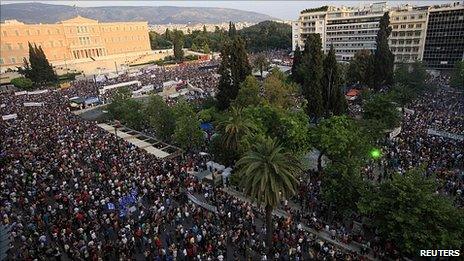Greeks stage huge Athens rally against austerity cuts
- Published

At least 60,000 protesters angered by cuts and tax rises packed into central Athens as Greek PM George Papandreou planned further austerity measures.
The crowd in Syntagma Square rallied outside parliament on Sunday night chanting "thieves!"
It was reckoned to be the biggest demo in 12 consecutive days of protests.
Mr Papandreou is trying to boost support for an updated austerity plan in his centre-left Pasok party before presenting it to parliament.
EU and IMF officials say the next tranche of their 110bn-euro ($159bn; £97bn) bail-out package for Greece will be paid, most likely in July.
Reports say a new bail-out package is being prepared for Greece, although the amount has not been revealed. It would cover Greece's borrowing needs for this year and next.
'Indignant Citizens'
The Papandreou government was forced to impose tough austerity measures as a condition for receiving the 110bn-euro bail-out.
But the economic pain has triggered widespread protests - the latest inspired by the large-scale sit-in staged last month in Spain, where youth unemployment has reached record levels.
The Greek protesters called themselves "Indignant Citizens" - a label borrowed from their Madrid counterparts, known as "los indignados" (the indignant).
There were slogans such as "take back your measures" and "Greece is not for sale". Another banner read "Thieves - hustlers - bankers".
The organisers said they were independent of the trade unions, which have also staged anti-austerity protests in recent months.
The new austerity plan under discussion in Mr Papandreou's cabinet calls for 6.4bn euros of extra savings this year alone, Reuters news agency reports.
Last week a group of 16 Pasok MPs sent the prime minister a letter calling for a full debate on the new package before it is put to a vote in parliament later this month.
Any new international bail-out funding would have to be agreed by eurozone finance ministers, who are scheduled to meet on 19 and 20 June.
International lenders say the government must stick to its programme of public sector job cuts and speed up privatisations aimed at raising 50bn euros by the end of 2015.
The original bail-out plan had envisaged Greece returning to the financial markets in 2012 to help tackle its debts.
But with its two-year borrowing cost currently at about 25% per year, the market is effectively closed to Athens.
- Published25 April 2013
- Published2 June 2011
- Published27 May 2011
- Published17 May 2011